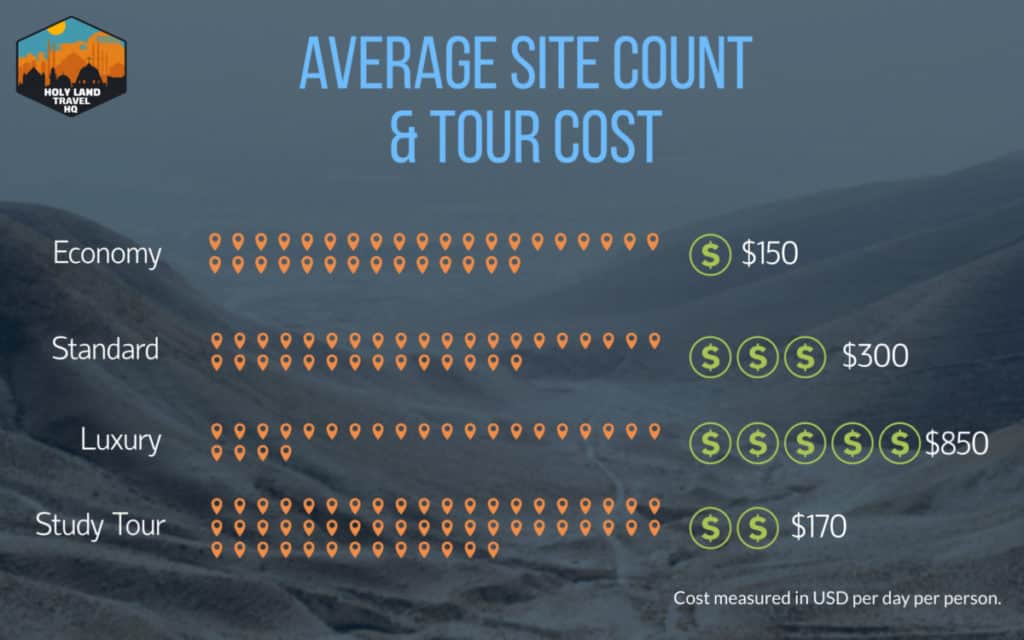
How much am I going to spend? It’s the most important question on any traveler’s mind. But not all Holy Land tours are created equal. And the cost is not necessarily tied to the quality of the tour.
So, how much does a Holy Land tour cost? The average cost for a standard tour of the Holy Land, without airfare, is $300 a day per person. Assuming you opt for a roommate throughout the trip. A luxury trip runs around $850 per day per person. An economy trip is about $150 per day per person.
Besides the obvious quality of life differences, the underlying variances can be problematic if you are looking for a theological experience.
What does a tour package include?
All tour packages include a double occupancy room with your spouse, if you are married, or a roommate. Rates go up if you opt for a single-occupancy trip. For luxury trips, this is usually around $2500 to $3,000 on top of the trip cost.
Providing ground transportation to and from the airport is the standard. No tour company is going to make a customer figure out how to navigate a city they aren’t familiar with. They’d get annihilated on Yelp or Trip Advisor.
Two meals a day are typically provided through the hotel accommodations. By the end of your trip, you’ll be wavering on which breakfast buffet was the best. Dinners are often buffet style as well but sometimes are served family-style. Occasionally there is some skimping, but generally speaking, you’ll be well-fed. Lunch is often on your own.
The tour bus is part of the package. Buses can vary depending on the size of the group. The most common tour bus used is a motorcoach, like a Greyhound bus. Don’t worry, though; drivers keep their vehicles clean. The tour guide will have access to a microphone so everyone can hear as well. Some busses are equipped with WiFi and electrical outlets.
Park passes are also included. The sites in Jerusalem are free. However, almost everything outside the city is under the national park system. But there is no need to worry about having the cash to get in. Your tour leader will have your passes pre-bought and ready to go.
The only thing not covered is airfare. For almost every tour package, you’ll have to buy your tickets separately. Sometimes, church specific tours will include airfare so the group can travel together.
What sites are on a decent Holy Land Tour?

Israel is full of religious and religiously significant sites to see. You won’t be able to get all of them in on a ten-day trip. But there is a bit of a standard for Christian Holy Land tours.
Every trip will include Caesarea, a port city that Herod built to honor Caesar. Despite Herod’s reputation for being a horrible person and a diabolic ruler, he chartered many impressive engineering projects. One of these is Caesarea, in which he had his palace built on top of the water. By modern standards, that doesn’t sound remarkable; however, in the first century, it was.
Many of these tours travel through Acre (ancient Akko) on the way to Nazareth and Galilee. In Galilee, you’ll stay in Tiberias. You will visit Capernaum, the home town of Peter. Tabgha, the traditional site of the feeding of the five thousand. The Mount of Beatitudes. And a boat ride on the Sea of Galilee.
Some tours hit the Golan Heights to view Mount Hermon. Usually, the nine- or ten-day trips.
Then it’s off to Jerusalem. The list of sites in and around the Old City is long. Every trip will stop at the Israel Museum to see the Dead Sea Scroll exhibit. The Holocaust Museum might be included, as well.
In the Old City, you’ll see the Temple Mount, the Western Wall, the Church of the Holy Sepulcher, and walk the Via Del Rossa. On the way to The Mount of Olives, you’ll stop in the Kidron Valley at the Church of All Nations to see the Garden of Gethsemane.
Depending on the theological commitment of the tour, you may or may not stop by the Garden tomb.
Next, you’ll make your way east to the Jordan River, stopping in Jericho on the way. It’s hot, so be prepared. Before dipping in the waters of the Dead Sea, you’ll climb Masada. Don’t worry; there’s a cable car to the top if you don’t want to hike it.
Last but not least, you will stop at the baptismal site at the Jordan River. Then onto Qumran to see how the Essenes lived.
What’s So Special About Luxury Holy Land Tours?
The only advantage of a luxury tour is the accommodations. They’re better than the so-called “5-Star” hotels listed on the Economy and Standard tours. The accommodations are the sole reason why these tours cost so much. There is nothing special about the itinerary.
A quick look at the itineraries for the luxury tours I researched revealed fewer site visits. They only hit the major sites, opting for more personal time to shop and sightsee on your own.
Another problem is the theological focus of the trip. These tours are geared towards religious faith in general. Some luxury, as well as economy tours, will stop at the Baha’i Shrine near Haifa. Baha’i is a pluralistic religion founded in the 1800s which celebrates the worth of all religions.
None of the Luxury tours I researched stopped at the Kabballah center, but many economy tours do. Some of the standard tours do as well. Any tour which has either of these sites on them is not going to have a solid theological focus.
As far as the tour guides themselves. The companies I researched did not introduce their guides or they provided very little information on the guides they employ.
If you are deeply committed to walking a life for Christ and want a tour focused on truth, I recommend staying away from the Luxury tours.
What is missing on the Economy Tours?
Many of the economy tours bill themselves as ‘luxury’ tours. They tout 4- and 5-Star accommodations. Something to understand is that every tour is paying the same price for transportation and site admission. The primary difference is the accommodations.
As far as the itineraries, the economy tours appear to hit more sites than the luxury tours. The reason for this is that luxury tours are geared towards travelers with expendable income. They want to visit, AND they want to shop. Economy tourists typically don’t have the extra money to shop. So, they aren’t given much time to do so.
The economy tours suffer the same theological focus problems as luxury tours. Most economy tours are facilitated by in-country tour companies. Tour guides will know the religious landscape. However, they will most likely not have the education to provide a quality experience.
The fact that the Baha’i Gardens are on many itineraries shows the lackluster theological commitment. If you are on a budget, you may have to settle for an economy tier tour. My recommendation, though, is to start a saving plan to work towards a Standard tier tour.
What makes the Standard tours so much better?
There are a few US-based companies that coordinate travel for church groups. They are typically Christian organizations designed to help pastors, church leaders, and scholars build a trip.
When a pastor, or leader, wants to lead a tour, they will offer spots to their congregation first. Or to people they know through their network of friends and associations. Sometimes, when they need more people for a trip, the company will advertise the trip on their website.
Many of these companies also run tour groups of their own. They will hire experienced pastors, church leaders, or scholars to lead these trips. Having a seminary-trained tour leader will focus the trip and provide a better experience.
These pastor-lead tours are the ones you want to look for. If you come across one through your church community or network of friends, your ears should perk up.
The cost for a standard tier tour is between $250 to $350 per day per person. Or an average of $300 per day per person. This range aims for accommodations solidly in the 5-star level. Tour companies want to ensure the experience is not distracted by poor quality of life for their travelers.
What probably breaks standard tier hotels out from economy tier hotels are the meals.
There are some standard tier tours out there that are not theologically focused, so be aware. One differentiating factor you need to look for is whether the company is a “general” travel group vendor. As in, they offer group packages for locations all around the world. Or if they are a specialized Christian tour company. A second determining factor is the itinerary. If the Baha’i Gardens or the Kabbalah Center are on the list, look elsewhere.
Diving Deeper.
Let’s say you want a really special Holy Land Travel experience. Or maybe you lead trips and want to develop your craft. What you need is a study tour. A study tour is characterized by the fact that it is attached to a for-credit course. Or, it is itself a for-credit course through an academic institution. One such institution is Jerusalem University College (direct link to juc.edu) or the JUC.
The JUC is located in Jerusalem. It is accredited to offer master’s degrees and certificates in biblical geography and history. They also offer a couple of for-credit courses that anyone can take.
The 3-week Historical and Geographical Settings of the Bible course introduces students to the geography of the land. An academically qualified instructor will teach the course. Students will visit dig sites and various locations that regular tours will not go.
An example is the Valley of Elah, where David and Goliath fought. You will stand on the hill where Saul and his army camped. When you see how small the valley is, your understanding of the story in 1 Samuel will become real.
The 2-week Jesus and His Times course takes students through the physical path of Jesus’s ministry. Many of the sites overlap with the 3-week course, but the curriculum is different.
The JUC also offers a non-credit course for pastors. The course is a shortened version of the 3-week course.
These courses/tours are quality tours. You will not find anything better. The JUC’s theology is focused and on the mark. Also, the faculty instructing the courses are well trained and knowledgeable.
Anyone can take these courses. If you are in an academic program, and desire to take a course for credit, talk to your school. If you just want to go deeper, contact the JUC through their website for more information.
How much does a study tour cost?
If you choose to go with the JUC, the overall costs are not much different from the Standard Tier tours. But the per day costs are less. For their 3-week course with on-campus housing, the cost is $3,600, excluding airfare. So about $170 per day per person. This price also includes accommodations on the Galilee and Negev studies. There are also hotel options for couples while in Jerusalem.
The 2-week course with on-campus housing runs around $2,420, excluding airfare. So about $170 per day per person. Accommodations for the Galilee tour are included in the cost.
Three meals are included in the price as well. The JUC can offer these rates for a couple of reasons. One, they manage their own campus housing. So, no maid service. And two; they plan, staff, and execute the courses/tours on their own.
One note on the JUC courses. Because of the geographical nature of the curriculum, there are a couple of trail hikes on the itineraries. They are not hard, but if you have health issues or can’t make the hikes, that is not a problem. You can stay on the bus and travel with the driver to pick up those who went on the hike at the finish.
The JUC does not provide transportation to and from the Airport. However, they do provide directions on how to obtain transportation upon arrival. On departure, they will set transportation up for you, but you will have to pay. It’s roughly $35-$40 each way.
Final Thoughts.
The major factor affecting the cost of all these trips comes down to accommodations. Once we look beyond that, it becomes clear which tours to look at. Overall, paying between $250 to $350 per day per person is the range you want to expect.
Your first option is to seek a Holy Land tour through your church or network of friends. The next option is to check out the tours offered on Christian travel sites.
Before signing up for a trip, though, contact the site to inquire about the tour leader or leaders. Find out their background and qualifications for running a tour group.
Your last option is to do a study tour.



